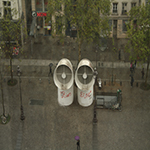Euroacademia Conferences
 Europe Inside-Out: Europe and Europeanness Exposed to Plural Observers (9th Edition) April 24 - 25, 2020
Europe Inside-Out: Europe and Europeanness Exposed to Plural Observers (9th Edition) April 24 - 25, 2020 Identities and Identifications: Politicized Uses of Collective Identities (9th Edition) June 12 - 13, 2020
Identities and Identifications: Politicized Uses of Collective Identities (9th Edition) June 12 - 13, 2020 8th Forum of Critical Studies: Asking Big Questions Again January 24 - 25, 2020
8th Forum of Critical Studies: Asking Big Questions Again January 24 - 25, 2020 Re-Inventing Eastern Europe (7th Edition) December 13 - 14, 2019
Re-Inventing Eastern Europe (7th Edition) December 13 - 14, 2019 The European Union and the Politicization of Europe (8th Edition) October 25 - 26, 2019
The European Union and the Politicization of Europe (8th Edition) October 25 - 26, 2019 Identities and Identifications: Politicized Uses of Collective Identities (8th Edition) June 28 - 29, 2019
Identities and Identifications: Politicized Uses of Collective Identities (8th Edition) June 28 - 29, 2019 The European Union and the Politicization of Europe (7th Edition) January 25 - 26, 2019
The European Union and the Politicization of Europe (7th Edition) January 25 - 26, 2019 7th Forum of Critical Studies: Asking Big Questions Again November 23 - 24, 2018
7th Forum of Critical Studies: Asking Big Questions Again November 23 - 24, 2018 Europe Inside-Out: Europe and Europeanness Exposed to Plural Observers (8th Edition) September 28 - 30, 2018
Europe Inside-Out: Europe and Europeanness Exposed to Plural Observers (8th Edition) September 28 - 30, 2018 Identities and Identifications: Politicized Uses of Collective Identities (7th Edition) June 14 - 15, 2018
Identities and Identifications: Politicized Uses of Collective Identities (7th Edition) June 14 - 15, 2018
European Identity Construction between Vision and Action
-
-

-
Presentation speakers
- Nora Schröder, University of Konstanz, Germany
- Download presentation
Abstract:
European identity, here understood as an open, continuous and heterogeneous process of identification by individuals within a plurality of life forms, is definitely not the final solution for all the challenges we are facing in Europe these days. It is not as simple as this. It is a complex construct which is embedded in complex social relations, as well as personal experiences of the past and visions of the future Europeans want to live in. In my paper, I focus on the question of how young people’s political action for a future Europe lead to several diverging European identities, based on their personal visions of Europe. While political leaders are trying to sell that idea of a “single Europe” in the context of European identity politics, Rumford and Buhari – Gulmez point out that Europe has always been and still is characterized by its “European multiplicity”. My research, likewise, indicates that a single Europe for Europeans does not exist and is not worth striving for. Europe can best be understood by acknowledging that it is characterized by and can progress in the interplay of individually developed visions of Europe. In order to clarify how the concept of “vision” is understood in the paper I will refer to Ernst Bloch’s philosophical concept of “concrete utopia” in his book “The Principle of Hope” (Bloch, 1959). The active and participatory impulse that visions of a future Europe give to young Europeans can be regarded as a way to respond to the European crisis that they are facing today. By referring to political participation for Europe, I seek to develop an alternative concept of European identity. In contrast to an essentialist perspective on European identity, I will connect the construction of a European identity with Habermas’ idea of “Doing Europe”, a kind of active European citizenship that underlines the constructivist character (and so the variability) of Europe. With Habermas, I see the personal experience of Europe as an influential social reality. The collective activity of building a better European future is just as fundamental for developing a personal European identity. Whereas I see the European Union’s rhetoric of a collective“European Identity” only as an expression of the political ideology of the technocratic and elite-driven project of European integration. How to think in a new way about “European identity” beyond the ontological theories of society is the core task of the paper. Its approach to European identity is located in the inspiring interdisciplinary field of ideas from philosophical, political and sociological European studies. The paper shows that European identity can best be understood by acknowledging its draft character: that Europe is characterized by and can progress along with the interplay of individually developed visions of Europe on the basis of personal experience. Therefore, the absence of a collective European Identity will not be regarded as a deficit but as a productive possibility of Europe’s future development. The examination of future visions of Europe, give new insights into how Europe is perceived today. It needs to be further discussed how future visions can help to understand European identity construction in the present European context. Methodologically, I conducted qualitative research in semi-structured guideline interviews of young and politically active Europeans and underpinned my arguments with evidence from European sociological research.
-
Related Presentations

Art in Oslo: Old, New, Borrowed and Blue – Creating a New Identity for the City and its People
- Ekaterina Bagreeva

Legal and Political Aspects of the European Union Citizenship
- Zbigniew Czubinski

Federal Techniques for Protecting the Rights of Linguistic Minorities: The Belgian Model
- Ludo Veny
- Brecht Warnez

The Politics of Globalization and Heritage in Havana, Cuba
- Gabriel Fuentes

Trans-Groups Duties and Common Sense or the Politics of Multiculturalism
- Corrado Fumagalli













